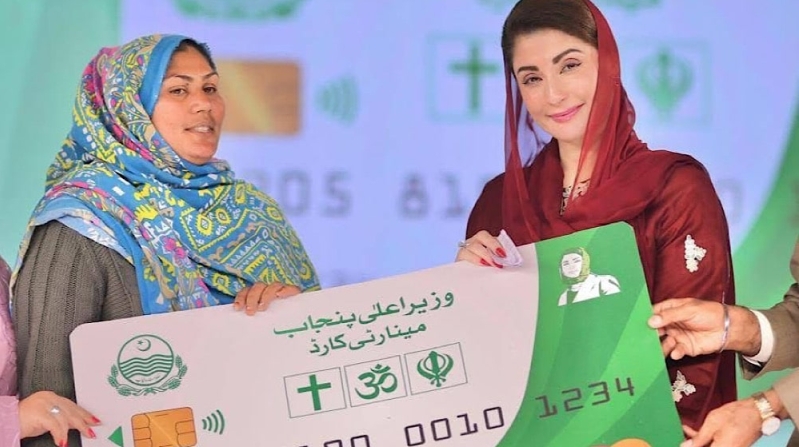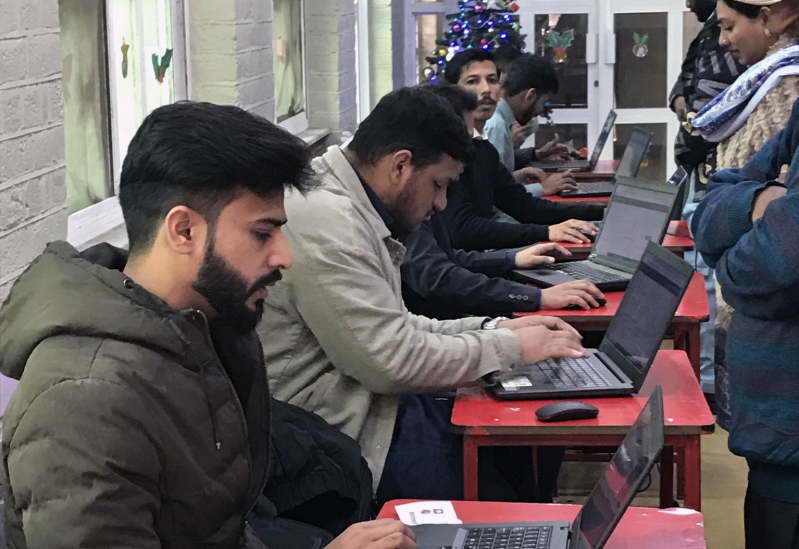
Punjab’s chief minister, Maryam Nawaz Sharif, has introduced a cash card program for religious minorities, marking a historic step toward addressing marginalization in Pakistan’s most populous province.
The “Minority Card” will provide 10,500 Pakistani Rupees (approximately US$37.65) per family every quarter to Christians, Sikhs, Hindus, and other minorities living in Punjab. The program, launched on Jan. 22, initially aims to benefit 50,000 individuals but will expand to 75,000 in the coming phases, Sharif announced. She also pledged to increase the quarterly stipend.
Festival grants for minorities have been increased from 10,000 to 15,000 Rupees (approximately US$36 to US$55), while the annual development budget for minorities has risen by 60%, Sharif said during the launch ceremony, which was attended by religious leaders and representatives of Christian, Hindu, Sikh, and other communities.
“I am very happy that for the first time in Pakistan and Punjab’s history, we have launched the minority card,” Sharif said. She emphasized that minorities are like the “crown on her head” and said their true identity is not as non-Muslims but as “true Pakistanis.”
“It is our responsibility to protect the minorities and improve their lives. I am duly fulfilling my duty to grant protection to the minorities with full responsibility. We will hinder the path of those who endanger the lives and property of the minorities with an iron hand. Whenever any dangerous situation emerges for the minorities, I myself monitor and oversee it as minorities are a symbol of pride for us,” she added.
'A significant milestone'
Quoting a Hadith of the Prophet Muhammad, Sharif said: “Whosoever oppresses a non-Muslim, snatches his right, puts burden on him more than his capacity or takes away anything from him without his will, I will be a witness against him on the Day of Judgment.” She described this Hadith as a guiding principle for how to treat minorities.
Sharif, Punjab’s first female chief minister, praised the contributions of religious minorities to Pakistan’s progress and development. “Though minority communities may be fewer in number, they are not less than anyone else with regard to displaying patriotism and humanity,” she said.
Sharif also highlighted her participation in religious festivals of minority communities and noted her historic visit to the Maryamabad church. “When I first went to Maryamabad church, I was told that I was the first chief executive of Punjab province who had visited the church in 103 years,” she said.

The initiative was implemented with the support of Punjab Minority Affairs Minister Sardar Ramesh Singh Arora and the Bank of Punjab. Religious leaders, including Bishop of Lahore Diocese Nadeem Kamran, Sardar Saranjit Singh, and Pandit Lal, offered prayers for the program’s success.
Bishop Kamran called the program a significant milestone. “The Diocese of Lahore has already been instrumental in facilitating thousands of underprivileged Christian families by offering registration assistance for this program, ensuring they can benefit from the support provided by the Punjab government,” he said.
Critics call for employment opportunities rather than ‘paltry’ financial support
However, some Christian leaders have criticized the program. Adeel Rehmat, chief officer of Pak Mission Society, a leading faith-based humanitarian organization, said that the quarterly stipend was insufficient to address economic challenges.
“A majority of our people are engaged in menial jobs such as sanitary workers and farm laborers. How is a paltry amount of 10,500 Pakistani Rupees every three months going to bring any difference to their lives?” Rehmat said.
He suggested the government invest in better employment opportunities, educational scholarships, or microfinance programs to help marginalized groups improve their social standing. “Our people need to be empowered economically to raise their standard of living; otherwise, there will be no change in their situation,” he said in an earlier interview with Christian Daily International.
The government-set minimum wage in Pakistan is 37,000 PKR (US$132) per month. However, many private sector companies exploit workers by paying them between 25,000 and 30,000 PKR (US$90 to US$108) monthly. Sanitary workers often face additional challenges, with their salaries frequently withheld for months.
Christians and other minorities continue to face violence
Religious minorities in Pakistan have faced persecution, including attacks by militants and mob violence. In August 2023, an angry mob in Jaranwala, Punjab, torched multiple churches, homes, and businesses after two Christian men were falsely accused of blasphemy.
Christians make up 1.37% of Pakistan’s population of 241 million, according to the 2023 national census. Most Christians in Pakistan live in Punjab, where many struggle to make a decent livelihood for their families.





